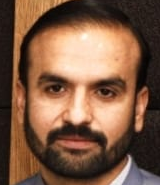خلاصہ
Sajid Ali is a dynamic and highly committed mid-career humanitarian professional and keen researcher with more than 11 years of experience in Municipal Solid Waste, Sewerage, Drainage and Landfill site Management, Advocacy and Accountability, WASH in Schools and health care facilities and in the Community, Environmental Health, Behavior Change Communication, Water quality and social mobilization. Holding an M.Phil. degree (18 years) in Environmental Sciences; Sajid has comprehensive knowledge and expertise in managing field operations, supervision of teams with more than 500 employees, Budget and project management with demonstrated skills in advocacy and accountability, program reporting, social mobilization and strong coordination skills for effective engagement of stakeholders, including government agencies, NGOs, and community-based organizations to advocate for policy reforms, promote transparency and foster community participation in decision-making processes. Sajid has successfully managed multiple projects from various donors including ECHO, WHP, WHO, UNICEF, SV, AusAID, and DFID. He is also passionate about enhancing the skills and knowledge of stakeholders, conducting training, workshops, and contingency planning sessions. His mission is to make a positive difference in the lives of vulnerable communities by improving their access to safe water, sanitation, and hygiene.
پراجیکٹس
تجربہ
Assistant Manager Solid Waste Management
Managing municipal solid waste management section from planning and implementing waste management strategies and programs to ensure efficient and effective waste collection, transportation and disposal processes.
Preparing and managing the waste management budget, ensuring resources are allocated efficiently.
Preparing outsourcing contracts, technical sanctions, contractor’s interim payments, and technical and financial assessments for sanitation services provision to entities like hospitals, societies etc.
Directly Supervising a workforce of 590 workers and 101 fleet/vehicles/machinery across (8) Union councils and five major roads in Peshawar for the provision of sanitation services within the assigned zonal jurisdiction.
Solid Waste Management Expert
In this consultancy, a detailed assessment of Municipal Corporation (MC) Kabirwala was carried out using value stream mapping and a complete set of Standard Operating Procedures (SOPs) was drafted for an end-to-end municipal solid waste management and machinery procurement plan including specification and deployment of each machinery.
Several consultative workshops were arranged for data sharing, verification and inclusion of feedback from local communities and other stakeholders.
A comprehensive training module was furnished on Solid Waste Management (SWM) SoPs for different cadres of workers and senior level officers in close coordination with Punjab Local Government Academy (PLGA) Lala Musa and GOPA experts and 28 no’s of staff were trained in PLGA
Assistant Manager Solid Waste Management
Managed Municipal Solid Waste Management section within eight (8) Union councils and five major roads in Peshawar through the direct supervision of a workforce of 590 workers and 101 fleet/vehicles/machinery.
Managed overall operations from planning to execution, special sanitation campaigns, public dealing, documentation, complaint redressal mechanism, and external and internal coordination.
Prepared and managed the waste management budget, ensuring resources are allocated efficiently.
Prepared outsourcing contracts, technical sanctions, contractor’s interim payments, and technical and financial assessments for sanitation services provision to entities like hospitals, societies etc.
Assistant Manager Sewerage & Drainage Systems
Served in additional capacity as Assistant Manager of the Sewerage and drainage system of WSSP Zone-D for the repair and maintenance, cleaning and operationalization of a 455 km sewerage and drainage system.
Managed WSSP staff (More than 200 staff), machinery and external contractors in the planning, monitoring and execution of the preventive maintenance, and emergency response during urban flooding and necessary changes in the sewerage and drainage network.
Assistant Manager Solid Waste management/dumping facility-Landfill site
Managed sanitary landfill site operations through supervision of proper staff and fleet deployment per WSSP-notified protocols and EPA-KP minimum standards.
Participated and attended all the external and internal hearings/Khuli Kachehry’s related to sanitary landfill operations during the job tenure and ensured/applied remedial measures within the available/in-house resources.
Project Officer; Advocacy & Accountability-KP
Worked with a range of stakeholders including local communities to duty bearers/office holders. i.e., Allies within the Provincial Government: Department of Health, Relevant DCOs, Right to Information Commission, Local Governments, PSPU/HSRU, SMU/IMU and Health ministers and Community Representatives, Elected Representatives, Bar Associations, Trader Associations, Religious Scholars, Media for addressing health and nutrition issues at BHU/RHC level through advocacy and accountability in the districts of Peshawar, Nowshera, Mardan and Swabi.
Formed, built capacities, and utilized both districts and provincial advocacy forums for improvement in health and nutrition services with the use of additional tools like corner meetings, lobbying & media and one-to-one meetings at project districts.
Identified and highlighted case studies, most significant change, challenges, and success stories for Newsletters and reports. Maintained close liaison with the Community Empowerment and Voice and Accountability teams and supported the operations and Finance team to ensure the smooth implementation of the activities.
Program Manager (WASH in Schools)
Led the implementation of the Terre des Hommes foundation-funded school WASH program in 92 floods affected Government Primary schools of District Nowshera, KPK Pakistan.
For the first time in Pakistan a new tool called fund generation mechanism (FGM) was introduced, implemented and evaluated for project sustainability at the school level through this project.
Successfully planned and executed the project activities as per the approved plan with desired quality through close monitoring of hard and soft activities and financial management.
Kept strong coordination with both FLOWERS and Tdh senior management within Pakistan, contributed to global newsletters, IEC materials designing and other visibility from the Pakistan team.
Environmental Health Manager
Successfully implemented IRC-funded local organizations/IPs in emergency response to the Internal Displaced Persons (IDPs) of South Waziristan at District Bannu by provision of technical support and budget management.
Served as co-lead for the WASH cluster on both provincial and district levels during the project period.
Timely completed project activities with desired quality through close monitoring and supervision of partner organizations in line with project approved plan and budget.
District Behaviour Change Communication Coordinator
Built capacities of 598 officials including 234 Department of Health Bannu staff & 364 Merlin project staff through budgeted training through in-house sessions and hiring of trainers from Provincial Health Services Academy (PHSA) Peshawar in a multi-donor funded (ECHO, WFP, Save the Children and WHO) emergency response integrated health, nutrition and WASH project in Bannu.
Drafted and implemented the first-ever Social and Behaviour change communication strategy for the Merlin Bannu team and was successfully replicated in District Peshawar, Buner and Bannu.
Served as focal person for all provincial emergency response clusters, government departments and district administration during the emergency response period.

Program Reporting Officer-Environmental Health
Led the implementation of an Australian Aid-funded community-driven environmental health project across 120 villages in 3 districts of Nowshera, Mardan and Peshawar by preparing and implementing the Community-Based Disaster Risk Reduction (CBDRR) plans and applying the Community Led Total Sanitation (CLTS), School Led Total Sanitation (SLTS), Pakistan Approach to Total Sanitation (PATS), Participatory Rural Appraisal (PRA), Participatory Learning and Action (PLA) tools for declaring 120 villages Open Defecation Free (ODF) with the support of local communities and project volunteers.
Water Quality Testing Officer
Carried out water quality monitoring of existing and planned drinking water sources, and supported engineering teams in the selection of sites for the installation of water sources by implementing the defined criteria for Tiraah Valley internally displaced persons in different parts of Kohat.
Built capacities of the project team and implementing partners and local communities on drinking water quality during emergencies.
Served as a focal person from the IRC side for water quality and humanitarian response clusters and district administration during the emergency response period.







